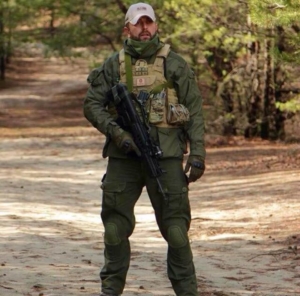Ex-Georgian President Mikheil Saakashvili said on Oct. 23 that the Interior Ministry’s National Guard had kidnapped, beaten and illegally deported to Georgia three of his associates.
The deported Georgians said they were flown to Georgia on a National Guard plane with bags put on their heads, according to Saakashvili.
The report comes amid major protests against President Petro Poroshenko co-organized by Saakashvili.
National Guard spokesman Vadym Holub told the Kyiv Post that “the National Guard is not involved in the issues of deportation,” but refused to explain whether National Guard members were present when the deportation took place and whether a National Guard plane had been used.
Saakashvili and his ally and lawmaker, Yuriy Derevyanko, said at a news briefing that the deportation violated Ukrainian law and legal procedure. They also submitted documents to the Prosecutor General’s Office to open a criminal case against those involved in the alleged kidnapping.
The State Migration Service said on Oct. 21 it had canceled the residence permits of two of the Georgians, while the third one had been in Ukraine illegally. State Migration Service spokesman Serhiy Hunko could not comment on the grounds for the annulment of the residence permits.
Hunko told the Kyiv Post that the three Georgians had been ordered by the State Migration Service to leave Ukraine voluntarily, and there was no court warrant for their forced deportation by Ukrainian authorities. He added that State Migration Service employees had not been present when the Georgians left Ukraine.
Under Ukrainian law, a person can only be deported by force if there is a court warrant.
The Georgians are David Makishvili, who fought against Russian-separatist troops in the Donbas and trained Ukraine’s National Guard; Saakashvili’s former driver Mikhail Abzianidze; and his former security guard Georgiy Rubashvili.
Abzianidze’s Ukrainian wife Karyna and his infant daughter were also present at the Oct. 23 briefing, and Karyna confirmed Saakashvili’s statement on Abzianidze’s alleged kidnapping.

David Makishvili, an associate of ex-Georgian President Mikheil Saakashvili who was allegedly kidnapped by the National Guard.
“I was kidnapped in the street by people who wore khaki clothing, two of them in MultiCam camouflage,” Makishvili told the Kyiv Post. “People who brought me to a plane on the airstrip wore National Guard uniforms, and people wearing Multicams were waiting for me on the plane. The AN26 plane belongs to the National Guard, and there were National Guard documents and journals inside.”
He said there were special force troopers of an unknown unit without insignia and a man in a border guard uniform on the plane.
Saakashvili said he believed the order to deport the three Georgians had been given by Poroshenko to National Guard Chief Yuriy Allerov.
Saakashvili also said that riot police and the Security Service of Ukraine’s Alfa special force unit had also participated in their deportation.
The Presidential Administration and the National Police said they could not comment immediately. SBU spokeswoman Olena Hitlianska told the Kyiv Post the agency had not participated in the deportation.
“It’s not a legal procedure,” Saakashvili said. “In this case it’s ordinary banditry.”
Saakashvili said that Ukrainian authorities’ actions reminded him of the mass deportation of Georgian citizens by Russian dictator Vladimir Putin in 2006 during a period of tense relations with Georgia.
“I hate (ex-President Viktor) Yanukovych, but even he didn’t do that,” Saakashvili said. “This can’t happen in any European country.”
Saakashvili said on Oct. 22 that he interpreted the deportation of his three associates as Poroshenko’s warning that he could also be deported.
The events have also been compared to ex-President Leonid Kuchma’s order to deport to Georgia journalist Georgy Gongadze, who was later murdered in 2000, and to the kidnapping of EuroMaidan activists under Yanukovych.
On Oct. 15, Ukrainian border guards also refused entry to Ukraine to Georgian lawmaker Koba Nakopia, an associate of Saakashvili, after the SBU banned him from entering Ukraine for three years.
In September the police also detained Saakashvili’s brother David in an effort to deport him but later released him amid a public uproar.
Zurab Adeishvili, who served as prosecutor general and justice minister under Saakashvili in Georgia, has also been banned from entering Ukraine, Vladimir Fedorin, an associate of Saakashvili and head of the Kakha Bendukidze Free Market Center, told the Kyiv Post.
Saakashvili was stripped of citizenship by Poroshenko in July in what he has called a measure that violates the Constitution, Ukrainian and international law and due process. He broke through the border on Sept. 10 and then launched a tour around Ukraine, rallying supporters.
